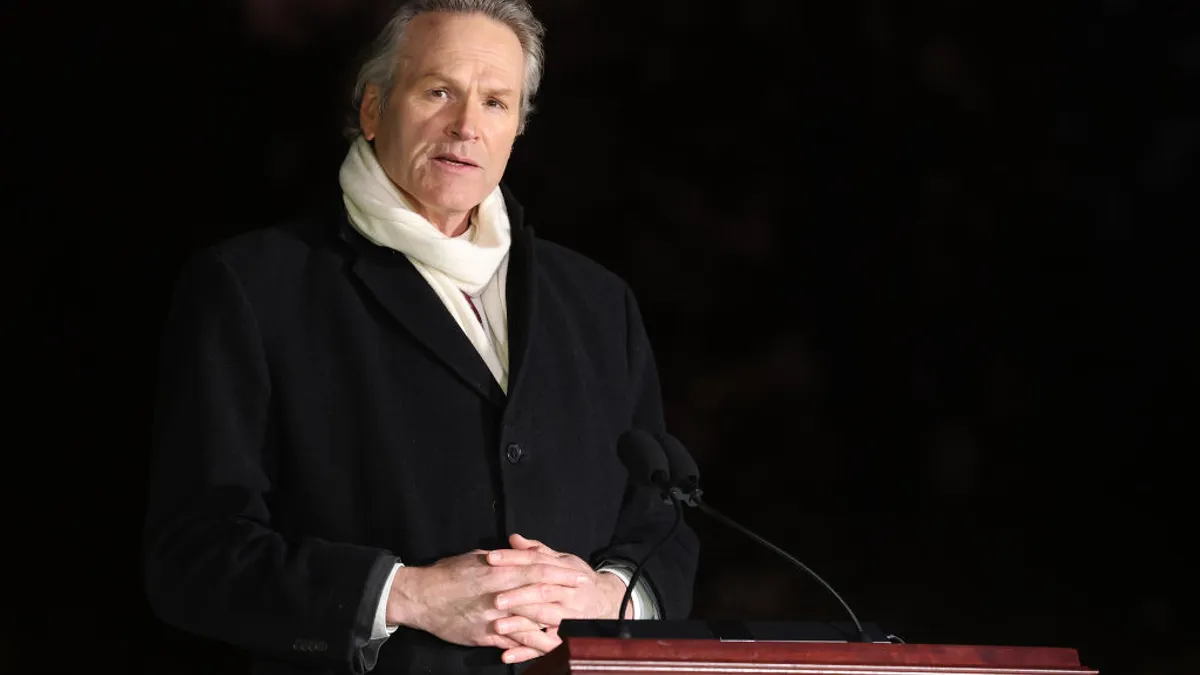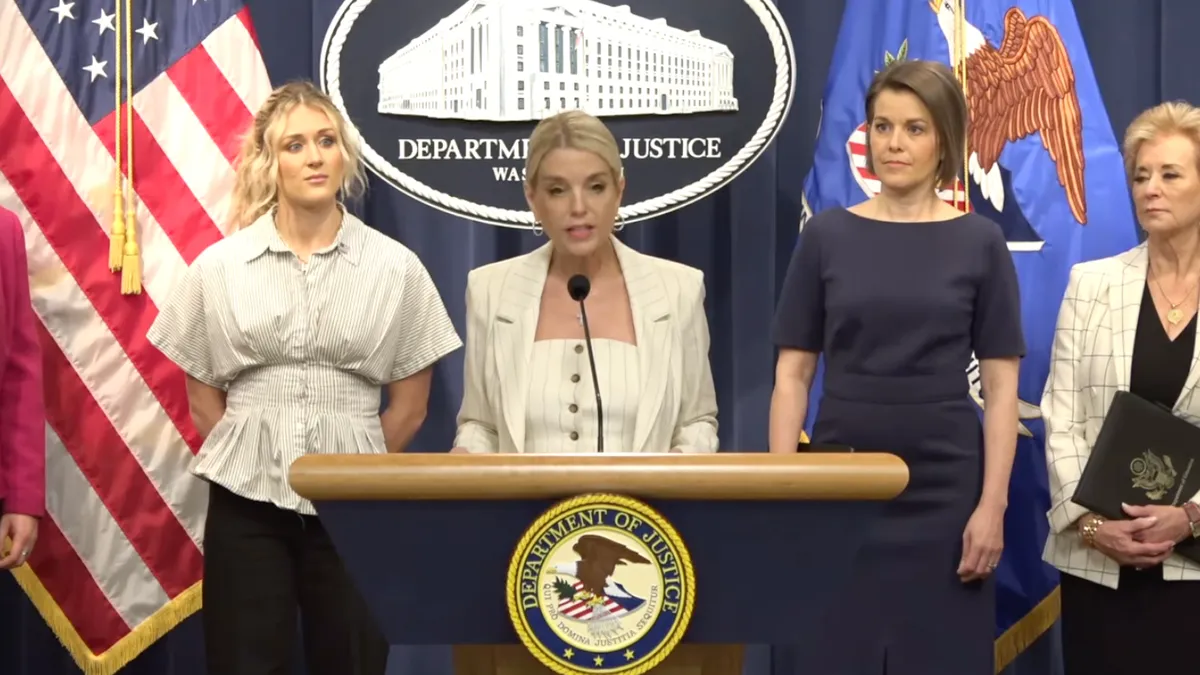After the U.S. Education Department abruptly disbanded its newly formed National Parents and Families Engagement Council on Monday, groups involved are sharing their disappointment but making it clear they will continue to urge the agency to make family engagement a priority.
The council never met, not even once, between the time the Education Department created and disbanded it, said Vito Borrello, executive director of the National Association for Family, School, and Community Engagement. NAFSCE was one of the 14 groups represented in the Ed Department’s council, and the organization appointed two parents as council members.
The Education Department had established the council in June to forge “strong and effective relationships between schools and parents, families and caregivers.”
A lot is on the line as political conflict grows in communities, hurting efforts to facilitate respectful dialogue in schools in addition to combating misinformation. Voter trust in public education has noticeably dropped since the pandemic, too. Experts suggest districts improve their own family engagement to address this declining public confidence, but there have been few federal efforts to help struggling districts facilitate this.
But just a month after the council’s formation, three conservative activist organizations — America First Legal Foundation, Fight for Schools and Families, and Parents Defending Education — sued the department to disband the council, alleging its members lacked “balanced” perspectives. The suit claimed that the council thus violated the Federal Advisory Committee Act.
Disappointment and celebration follow
While the Education Department said in a statement Monday that it disagrees with that claim, the agency decided not to move forward with the council anyway.
“We all share a vital concern for the future of our students, and our nation, regardless of our political, social, or cultural backgrounds,” the Education Department said.
The department said parents and families play a key role in building their children and community’s future, adding it has continuously worked to listen and engage with as many parents as possible.
Additionally, the Education Department said it would continue to connect with families nationwide through hosting town halls and providing resources. But Borrello said those kinds of efforts do not facilitate family engagement.
“Family engagement, according to NAFSCE’s definition, is not about good public relations,” Borrello said.
“So holding webinars or sending newsletters may be informative but in and of itself is not strategic," he said. "Strategic approaches that build the capacity of educators, school leaders and state and community-based organizations is what is substantive, and nothing less will be acceptable.”
While some who were represented on the council have expressed disappointment about being shut down, the groups that filed the lawsuit are understandably considering the council’s demise a victory.
“This faux parents council was nothing more than the administration trying to rig the system once more by stacking the deck with the very special interest groups that awakened parents across America to their long game to politicize public schools with a far-left, anti-parent agenda,” said Ian Prior, executive director of Fight for Schools and Families and senior advisor at America First Legal Foundation, in a statement.
Prior previously served as a senior official in then-President Donald Trump’s Department of Justice.
A ‘path of political mudslinging’
Keri Rodrigues, president of the National Parents Union, another group represented on the council, said in an emailed statement that the move reflects “another failure by both Democrats and Republicans.”
“Both parties claim to have the best interests of families and students, but in actuality, neither have done anything tangible to prove it,” Rodrigues said.
While elected officials continue their “path of political mudslinging,” Rodrigues said there are also ongoing data revealing a math and literacy crisis resulting from the pandemic.
The law in question — Federal Advisory Committee Act — requires an advisory committee’s membership to be “fairly balanced in terms of the points of view represented and the functions to be performed by the advisory committee.” Nearly 80% of the leaders of organizations involved in the National Parents and Families Engagement Council have donated to President Joe Biden or other Democrats, according to the lawsuit.
Considering the lawsuit came from Prior, a former official of Trump’s, Borrello said the efforts to thwart the family engagement council are “a political attempt to undermine” the Biden administration. Overall, this lawsuit is not considering the best interests of families and their children, he said.
“We’re deeply disappointed that politics have undermined this National Parents and Families Engagement Council, and equally disappointed in the department’s and this administration’s response to these politics,” Borrello said.
Just a few days before the council disbanded, five Republican U.S. senators wrote to U.S. Secretary of Education Miguel Cardona to raise concerns over the lawsuit’s claim of a “prejudiced” makeup within the council. The letter also said the council lacked enough parents and families at the local level.
To Borrello, these claims are not justified.
The council's goal was for national reach, he said. Plus, many of the organizations represented have extensive locally based networks. “This was not a group of people in Washington, D.C., coming to these events. They were parents from all over the country,” Borrello said.
Working with Cardona’s commitment
This council was one demonstration of the priority on family engagement that Cardona set out nearly a year ago, Borrello said.
In a January speech, Cardona expressed a need for “more meaningful and authentic parent and family engagement” as he detailed his vision and priorities for education during the Biden administration.
Several involved in the council, including NAFSCE, the National Parents Union, and the Council of Parent Attorneys and Advocates, have all shared their continuing commitment to push for federal family engagement priorities.
Moving forward, the department could enhance federal policies, guidance and funding through statewide family engagement centers, Borrello said. It could also increase resources for these efforts through Title I and the Higher Education Act.
“We expect to see strategic and substantive efforts that demonstrate his [Cardona’s] stated commitment,” Borrello said.








 Dive Awards
Dive Awards













